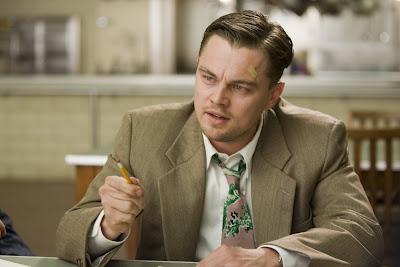"Listen, I'm tired of everyone staring at the bandage on my forehead - I don't know why it's there, either!"
Anal retentive that I am, it's the Little Things that always bother me in movies. An annoying minor character here, a slightly-off foreign accent there, maybe a meaningless misrepresentation of local geography (e.g., the inaccurate depiction of Red Rock Casino on or near Las Vegas Boulevard in the otherwise forgettable 21).
There were a lot of Little Things in Shutter Island that annoyed me (not the least of which was Leonardo DiCaprio's matchlit exploration of Ward C - what brand of long-burning matches illuminate a room like a Maglite?), but the prevailing problem I had with it was that Martin Scorsese didn't rectify them with substantial, even memorable scenes. In fact, it seemed he was content to surrender to formula and let all of the Little Things slide so long as he could get to that Big Bad Ending, which, I have to admit, nearly salvaged the movie.
Scorsese isn't necessarily known to be a sloppy director, but most people would probably call him a distinctive, even daring one, at least during the peak of his career. Isn't it bizarre, then, to see him submit to genre clichés in Shutter Island - and even then mix them awkwardly. One minute we're in the middle of a psychological suspense thriller (Cape Fear held its tone much better), the next we're in a jump-fright horror flick. Oh, and there's a couple of jokes and some romantic melodrama and political histrionics thrown in the pot as well. The result is a squirm-inducing stew of genres that leaves you feeling like you just had a bowl of bad New England Clam Chowder.
There were a lot of Little Things in Shutter Island that annoyed me (not the least of which was Leonardo DiCaprio's matchlit exploration of Ward C - what brand of long-burning matches illuminate a room like a Maglite?), but the prevailing problem I had with it was that Martin Scorsese didn't rectify them with substantial, even memorable scenes. In fact, it seemed he was content to surrender to formula and let all of the Little Things slide so long as he could get to that Big Bad Ending, which, I have to admit, nearly salvaged the movie.
Scorsese isn't necessarily known to be a sloppy director, but most people would probably call him a distinctive, even daring one, at least during the peak of his career. Isn't it bizarre, then, to see him submit to genre clichés in Shutter Island - and even then mix them awkwardly. One minute we're in the middle of a psychological suspense thriller (Cape Fear held its tone much better), the next we're in a jump-fright horror flick. Oh, and there's a couple of jokes and some romantic melodrama and political histrionics thrown in the pot as well. The result is a squirm-inducing stew of genres that leaves you feeling like you just had a bowl of bad New England Clam Chowder.







